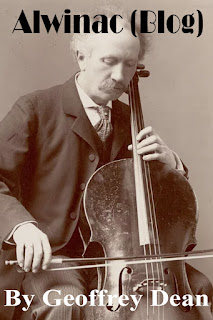 |
| [Click on image to go directly to the Alwinac’s home page] |
Alwin Schroeder’s status as a self-taught cellist gained widespread notoriety from at least as early as 1885. That year the Leipzig Musicalisches Wochenblatt (LMW) published a biographical sketch of the then 30-year-old Gewandhaus solo cellist emphasizing the unusual nature of Schroeder’s cellistic beginnings:
Those who hear Alwin Schröder play without knowing about his studies will assume that he has been playing his instrument since early childhood. … And yet that is not the case: Alwin Schröder did not discover his love for what is now his main instrument until very late in life, and the level he has reached at present is clear evidence of his great talent, since as a cellist he is completely self-taught, i.e., had no teacher.With certain variations and embellishments, the 1885 account of Alwin’s switch to cello would be repeated throughout Schroeder’s career, in sources including the Riemann and Baker biographical dictionaries of musicians and the Wasielewski and Van der Straeten histories of the violoncello and its players. The LMW profile tells it like this:
During this period, as chance would have it, he found a cello left behind by his brother Carl at their parents’ house and felt the urge to learn the familiar solo from Rossini’s William Tell Overture. As a joke, the next time his brother Carl visited their parents, he played it for him, but Carl took the successful attempt very seriously, and told Alwin to continue his studies of the cello in earnest. Alwin took his brother’s advice and used the free time he had – he had meanwhile taken a post with the Fliege Orchestra as a violinist, which took him to St. Pe tersburg – to continue studying the cello. He worked so hard that only a few months later he was able to exchange the violin for a cello. In autumn 1875 he became the first cellist in the Liebig Concert Orchestra…This narrative raises a number of questions that I will now explore....
No comments:
Post a Comment